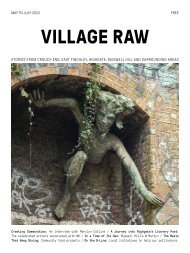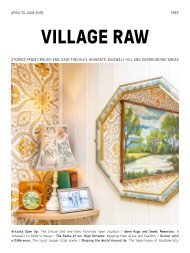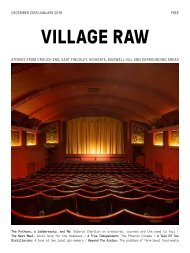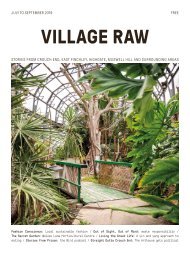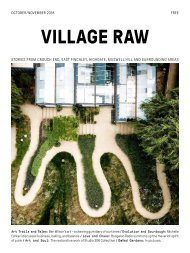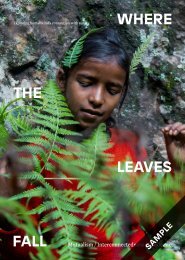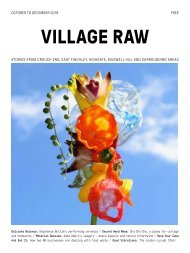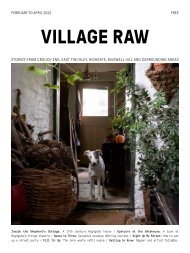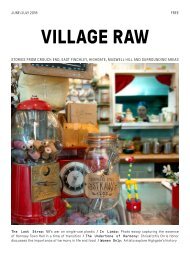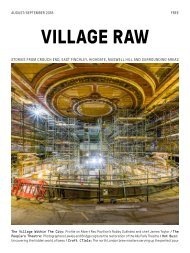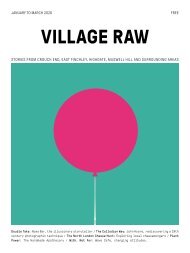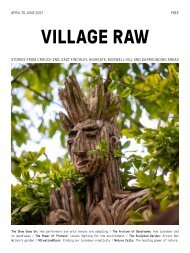Village Raw - ISSUE 11
Village Raw is a magazine that explores cultural stories from Crouch End, East Finchley, Highgate, Muswell Hill and the surrounding areas. The magazine is created by the community, for the community. If you like this issue you can support the project through a subscription or donation. See the links below. The eleventh issue of Village Raw includes: GROUNDED CREATIVITY - Painter and forager Lisa-Marie Price. THANK YOU FOR THE MUSIC - The lockdown repercussions for local musicians. SALVATION IN SEWING - A search for sustainable fashion results in clothes made from curtains. THE RISE OF THE COMMUNITY - A portrait of the community during lockdown. EDIBLE LONDON - From hobby farming to feeding half a million: Edible London. RECIPE FOR LIFE - How the Village Raw Weekly Recipe saw local chefs cooking up a lockdown storm. THE BUSINESS OF SURVIVING LOCKDOWN – Businesses adjusting to the lockdown measures. FOR THE LOVE OF CHEESE - How the Micro Cheesemonger came into existence. SEED SAVING - AN ACT OF REBELLION - An interview with OmVed Garden’s Seed Savers Network. AND MORE…
Village Raw is a magazine that explores cultural stories from Crouch End, East Finchley, Highgate, Muswell Hill and the surrounding areas. The magazine is created by the community, for the community. If you like this issue you can support the project through a subscription or donation. See the links below. The eleventh issue of Village Raw includes:
GROUNDED CREATIVITY - Painter and forager Lisa-Marie Price.
THANK YOU FOR THE MUSIC - The lockdown repercussions for local musicians.
SALVATION IN SEWING - A search for sustainable fashion results in clothes made from curtains.
THE RISE OF THE COMMUNITY - A portrait of the community during lockdown.
EDIBLE LONDON - From hobby farming to feeding half a million: Edible London.
RECIPE FOR LIFE - How the Village Raw Weekly Recipe saw local chefs cooking up a lockdown storm.
THE BUSINESS OF SURVIVING LOCKDOWN – Businesses adjusting to the lockdown measures.
FOR THE LOVE OF CHEESE - How the Micro Cheesemonger came into existence.
SEED SAVING - AN ACT OF REBELLION - An interview with OmVed Garden’s Seed Savers Network.
AND MORE…
You also want an ePaper? Increase the reach of your titles
YUMPU automatically turns print PDFs into web optimized ePapers that Google loves.
OCTOBER TO DECEMBER 2020
FREE
VILLAGE RAW
STORIES FROM CROUCH END, EAST FINCHLEY, HIGHGATE, MUSWELL HILL AND SURROUNDING AREAS
Grounded Creativity: Lisa Marie-Price’s abstract journeys / Thank You for the Music: pandemic repercussions /
The Rise of the Community: How we connected during the lockdown / Edible London: Tackling food poverty /
Recipe for Life: The weekly recipe / The Business of Surviving Lockdown: How local businesses adapted.
CONTENTS
EDITORIAL
OCTOBER TO DECEMBER 2020
FREE
VILLAGE RAW
STORIES FROM CROUCH END, EAST FINCHLEY, HIGHGATE, MUSWELL HILL AND SURROUNDING AREAS
04
06
10
14
16
VILLAGE NOTICEBOARD
Things to do and community notices.
GROUNDED CREATIVITY
Painter and forager Lisa-Marie Price
makes abstract art that explores
the connection between people and
nature.
THANK YOU FOR THE MUSIC
The lockdown repercussions
for local musicians.
SALVATION IN SEWING
A search for sustainable fashion
results in clothes made from
curtains.
THE RISE OF THE COMMUNITY
A portrait of the community during
lockdown, as we came to embrace
technology.
We commissioned most of the content of this magazine just as the lockdown
rules were beginning to ease. The editorial meeting, usually taking place in a local
cafe, was on Zoom – and that discussion was largely about how we were all
doing and feeling. So it felt appropriate that this issue of Village Raw should be
a reflection on these times, from a local perspective – as we collect our breath
and look to the future.
The lockdown underscored just how dynamic and resourceful we can be and
how local support and community has come to the fore. We hope that we can
continue in this vein as we reflect, adjust and move forward. On a personal level
we would like to thank everyone who stuck with us – the businesses that stocked
the magazine when their concerns were elsewhere, everyone who picked up a
copy to read, everyone who’s been in touch – for whatever reason. Also the lockdown
live musicians, the weekly recipe chefs, Maria (who helped spruce up our
social media), and the advertisers, partners and subscribers that have continued
to support us and made this issue possible. It’s a shorter editorial than usual
– but the thought is in the magazine and we hope you enjoy it.
David and Luciane
hello@villageraw.com
www.villageraw.com
Grounded Creativity: Lisa Marie-Price’s abstract journeys / Thank You for the Music: pandemic repercussions /
The Rise of the Community: How we connected during the lockdown / Edible London: Tackling food poverty /
Recipe for Life: The weekly recipe / The Business of Surviving Lockdown: How local businesses adapted.
By subscribing you’ll not only be supporting Village Raw,
but the community as well. You’ll also receive the magazine
delivered to your door every three months.
www.villageraw.com/subscribe
26
28
32
36
38
41
42
EDIBLE LONDON
From hobby farming to feeding half
a million: How Edible London grew
over lockdown.
RECIPE FOR LIFE
How the Weekly Recipe saw local
chefs cooking up a lockdown storm.
THE BUSINESS OF
SURVIVING LOCKDOWN
How local businesses adjusted to the
lockdown measures and how they are
feeling about what might come next.
FOR THE LOVE OF CHEESE
How the Micro Cheesemonger came
into existence.
SEED SAVING - AN ACT OF
REBELLION
An interview with OmVed Garden’s
Sonia Rego about their Seed Savers
Network.
KEEP CALM & WELL DONE
Acknowledging the emotional impact
of the pandemic.
VILLAGE GREEN
The Garden on the Mews.
EDITORS
Luciane Pisani
David Reeve
GRAPHIC DESIGN
Luciane Pisani for Studio Moe
COPY EDITOR
Julie Tang-Evans
ADVERTISING
Emma Withey
hello@villageraw.com
CONTRIBUTORS
Dorothy Barrick, Sophie Berkoff, Zoe Bee, Thomas
Broadhead, Giorgia Carlini, Rachel Davies, Fran
Hales, Hannah Duncan, Mischa Haller, Ed Hardy, Clare
Heal, Paul Henderson, Claire Jury, Shiri Kraus, Kate
Kuzminova, Becky Lima-Matthews, Jenny Linford,
Lobster and Pearls, Katrina Mirpuri, Zoe Norfolk, Carla
Parks, Lisa-Marie Price, Sonia Rego, Alan Rosenthal,
Susie Sandford Smith, Atoosa Sepehr, Venla Shalin,
Emma Svanberg, Ming Tang-Evans, James Taylor,
Matthew Thorpe, Kate Wilson, Dominique Woolf.
COVER IMAGE
...And So It Begins from the Isolation Walks series
by Lisa-Marie Price.
PRINTING
Printed in East Finchley by JG Bryson on chlorine
free paper produced by an EU Ecolabel certified
mill from FSC and PEFC regulated forests.
Village Raw October to December 2020.
Designed and published by Studio Moe Ltd.
© 2020 Studio Moe Ltd. All rights reserved.
Reproduction of any contents of Village Raw
magazine without prior permission of the
publisher is strictly prohibited.
THANKS TO:
Les Aldrich, Chris Athanasiou, Mikki Bartell,
Simon Bear, Richard Bell, Katherine Bree,
Sue Browne, Sue Browne, Charlie and the Oscillator,
Sofia Dickie, Christian Eldershaw, Andy Fenichen,
Paul Handley, Martin Hodgson, Jess from The Village
Green, Sunny Karagozlu, Karen Leason, Edmund May,
Sarah Moore, Madeline O’Connor, James Riley,
Kelly Shearer, Gabriella Swallow.
Tweet us: twitter.com/VillageRawMag
Like us: facebook.com/villageraw
Follow us: instagram.com/villageraw
Contact us: hello@villageraw.com
Support us: villageraw.com/subscribe
SCAN HERE WITH YOUR INSTAGRAM APP
TO FOLLOW US:
03
VILLAGE RAW
VILLAGE NOTICEBOARD
QUEEN’S WOOD
Kudos to the tenacious Queen’s Wood oak
protectors who have won a stay of execution.
The beautiful oaks are safe for at
least another year while the insurance
company AXA underpins the house and
monitors the subsidence. From 15 July
2020 the four oak trees have received
24/7 protection – with people camping
out every night. They have generated
national media coverage and enjoyed
visits and performances from musicians
including Sam Lee, London Lucumi Choir,
Phoebe Coco and Family and Regina
Rhythm. Signs and posters have been
painted by the protectors and children,
and artist Emma Franks repurposed her ‘I
care about you’ bunting.
You can keep up to date on Twitter:
@SHIFT_Haringey and on Instagram:
ctp_haringey
LOCAL ARTISTS
We were sad that neither Crouch End
Open Studios nor East Finchley Open Artists
could hold their events earlier this
year, Muswell Hill Creatives have had to
cancel their markets and it’s looking like
any autumn/winter events will also be
faced with challenges. The artists and
makers are all still busy and we recommend
following: @ceopenstudios @eastfinchleyopen
@n10creatives on Instagram for
updates and opportunities. Many artists/makers
are selling work through the
#artistsupportpledge, their websites and
their galleries.
For details on the artists/makers
check: www.crouchendopenstudios.
org.uk / www.eastfinchleyopen.org.uk /
www.muswellhillcreatives.com
ARTISTS WALK
Your daily walks are set to get more inspiring
from 14 November, as you’ll start
to see windows in the area filled with art.
Local creatives are invited to register with
Artists Walk - to display artwork in their
windows and be added to the online interactive
map. The aim is to bring the inside
out and showcase the pool of creativity in
the local community for all to enjoy.
Get involved at: www.artistswalk.org
and follow on Instagram: @artistswalk
ART CLASSES
To prepare for Artists Walk why not indulge
in an art class or session. Here are just a few
local suggestions: Art in the Village runs
a variety of adult and children’s classes
(www.artinthevillage.co.uk); explore your
creative potential at Highgate Art School
(www.highgateartschool.com); take adult
and children’s classes with Art Class London
(www.art-class-london.co.uk); join
Lisa (page 06) for her Kids Art Club - with
a 7-day free trial (www.theworkshopn4.
com); Community Crafternoons is currently
running over Zoom (Instagram: @communitycrafternoons
/ Facebook: @Sujan.
nandanwar).
SUPPORT LOCAL
It’s too easy to push the online ‘buy’ button
but why not think about supporting
local cafes, businesses, makers and creatives
this Xmas. Over the coming months
we’ll highlight opportunities on our Instagram
@villageraw and newsletter (sign
up on our website or use the QRcode). On
Sunday 15 November, Gifted Local will run
a virtual Xmas market (www.giftedlocal.
com) with free activities on offer, including
a mulled wine recipe from The Woolf’s
Kitchen, downloadable decorations by Colour
In Gold - and there’ll be a chance to win
a Christmas Hamper worth £100 packed
full of gorgeous goodies and treats.
GRANGE BIG LOCAL
Sadly, there will be no N2 Grange Big Local
Fun Palace this year but you can download
the Archer Arrows activity pack from
their Instagram @grangebiglocal (link in
bio) and Twitter @GrangeBL. Follow their
social media and check their website for
details of upcoming opportunities such
as the community grant programme, advice
on budgeting and a first aid course.
www.grangebiglocal.org
04 05
VILLAGE RAW
GROUNDED CREATIVITY
Painter and forager Lisa-Marie Price makes abstract art that
explores the connection between nature and people, using watercolour
paints sourced from foraged pigment. Village Raw spoke to her about
a new collection of work she created during lockdown.
Words by Becky Lima-Matthews. Photos by Paul Henderson.
Most people have had to change their ways of working and many
are facing financial uncertainty as a result of the Covid-19 pandemic.
But for self-employed creatives like Lisa-Marie Price, it
can mean a sudden loss of income. After graduating in Fine Art
from the University of East London (UEL) in 2008, she began freelancing
for charities like Kids Company and assisting other artists
before finding her own space in which to create and teach in N4.
For the past three years she has been running art classes
for children and adults at her studio, The Workshop N4, in Stroud
Green. With 2020 shows in the UK, including Crouch End Open Studios
and a group show in the Netherlands, postponed - and all
art classes temporarily moving online - Lisa-Marie had to think of
new ways to approach her work.
“Within a day my business just shut down and I’d been working
really hard for three years to get it as busy as it was - and ran it
very well. So I felt kind of lost. It took a lot of my energy to do the
classes and lots of time too. I had all this time, like everyone, and I
can’t sit still. I needed to make the best of it,” she says.
Soon she was finding inspiration from her daily lockdown walks
with Pearl, her dog, and foraging to collect rocks that she grinds
up with a pestle and mortar, adding water to make paint. “I’d had
the idea to start tracking my walks in Scotland so I decided to do
that here, even if it was just for 20 minutes - and try and make a
mini series. It sort of evolved and I was making more pieces - and
my art has changed a lot,” she tells me.
Reflecting changing times is a long-running theme in her
work. Two pieces that were featured in MK Calling in early 2020
represent the population growth and urbanisation of her home
town of Milton Keynes. The painting Population Momentum 1961 is
made up of 53,000 dots to represent the population of the town
at that time. The second piece Demographic Transition 2019 has
an incredible 270,000 dots to show the town’s huge growth, all
individually hand painted over 70 hours.
So, with additional time during lockdown it wasn’t long before
Lisa-Marie was creating further large-scale artworks. She explains:
“I had the chance to work on bigger pieces that can take
06 6
VILLAGE RAW
ART & CULTURE
a lot of time because my work is so detailed. But it means that I
can experiment a bit more and I can feel a little bit more relaxed
about everything. You don’t really have a choice. It is what it is. At
the start it was quite stressful and I lunged into doing an online
version of my after-school club on Instagram. But I’ve tried to find
a new schedule which is a bit admin and a lot of painting.”
“Coming to the studio five minutes from home has been
great, I know lots of artists who are working from their kitchen
table and they have no room - and lots of people are looking after
children. I feel lucky to have had the time and space to develop
my work a bit more,” she adds.
Despite the limits of social distancing, Lisa-Marie’s lockdown
wandering and art has created a sense of community offline as
well as online. Each new piece maps a different walk and throughout
the summer they were on display in her studio’s window and
at La Dinette in Muswell Hill. It’s given her the opportunity to show
some of her processes too.
“When you make the paint, you have to mull it on a glass plate
which leaves these beautiful marks so I made prints from that
process too. My work, it’s all entangled - the process of making… I
wanted to capture some of those moments as well.”
Adapting to new ways of working and living can also change
how we interact with our local area.
“I’ve found loads of new places. I think combining my art club
and my walks - I was hand-delivering art packs for children and
taking the dog - it was lovely to see these streets I hadn’t seen
before or finding small bits of green I hadn’t seen. The community
here is so supportive too which has been really helpful.”
Switching to Instagram classes designed to fit around parents’
frantic schedules keeps the community going while students
can’t make artwork together. “I’ve emailed the parents
to say if you’re passing the studio come and say ‘Hi’ - and I’ve
built some new community with people who have signed up to my
classes online. Parents DM me to share their kids’ work and I’ve
had some lovely feedback to say they’re still getting a lot from
them even though they’re missing their friends because they
can’t come to a class,” she says.
No stranger to change, Lisa-Marie turned vegan in 2017 and her
handmade paints are part of a drive to work in a sustainable way. So
I ask her to ponder what she hopes will come after the pandemic.
“I don’t think people should be too pushy or preachy - everyone’s
life is different. But it would be great to see little changes
even in the local community, with people shopping locally more,
which I think people have been doing during lockdown. Hopefully
they can keep it going.”•
To find out more about Lisa-Marie Price’s work visit: www.lisamarieprice.co.uk or follow her
on Instagram: @theworkshopn4
Becky Lima-Matthews: @becky_matthews_writer / Paul Henderson: @gis_a_look_man
Opening page: Lisa working in her studio, with some
of the rocks she grinds into pigment.
This page: Isolation Walk 054 (above); Lisa with
her American bulldog, Pearl.
08
09
VILLAGE RAW
VILLAGE SOUNDS
THANK YOU
FOR THE MUSIC
The music came alive when we
most needed it but what are the
repercussions of the pandemic
for local musicians?
Words by Katrina Mirpuri.
Postponed albums, cancelled tours and closed music venues are
only a few of the unforeseen hurdles that lockdown brought to
north London’s music community. The last few months have seen
safety and selfisolation as top priorities, meaning that months
of summer festivals and gigs were lost, leaving the musicians
involved having to improvise. As we slowly come round and say
‘thank you for the music’, we caught up with local musicians to tell
the story of how they survived, and kept - and are still keeping -
the music alive during the pandemic lockdown.
Singer-songwriter James Riley took matters into his own
hands after his sold-out album tour and slot at Glastonbury were
scrapped. With nowhere to perform and an entire album of new
songs to share, he decided that the rooftops of Haringey would
do just fine. “I couldn’t really leave the house and I was standing
there, scratching my head, looking at the roof before I thought
‘Why don’t I do a live stream on the roof?’.” The 28-year-old proceeded
to plan a one-off rooftop live stream as album promotion.
However, it ended up becoming a weekly occurrence. “There’s a
really active WhatsApp group on our street and my housemate
told the street that I was going to be doing the gig. I got there
and half the road had turned up. It became this thing where I was
playing to an online audience and the street - and from there it
just grew wings.” A few weeks in and Riley had accumulated both
a brass and country band along with an impressive socially distanced
crowd who line-danced to the music. While doing so he
supported an initiative called LIVE for Love UK that donates money
to local food banks.
On the flip side, electronic two-piece Charlie and the Oscillator
finished their debut album in January, which was due its release
in March - but the pandemic forced them to take a backseat and
PHOTO COURTESY OF FRAN HALES.
James Riley (on the
right) performing on the
rooftop alongside other
musicians - mashing up
Americana with grime.
10 11
VILLAGE RAW
Left: Sample-heavy dancefloor-friendly electronica duo Charlie and the Oscillator. Right: Gabriella Swallow performing a
socially distanced concert on 8 May 2020 at the Royal Albert Hall.
reflect. “The art and music got caught up in that. It restricted how
our promotion went and it was difficult for us to push this album
out there because people were more focused on how they were
going to survive,” says Charlie. Despite their inability to perform
the band has spent the last few months working on their second
album. “We need the world to open back up so we can promote it
properly and do some shows and launch things.” Although these
are difficult times their outlook is still optimistic. “Things could
get really exciting again. Everything goes in a cycle and we’re riding
out the dark bleak times - but I think there’s some really good
times to come in art and music,” says Charlie.
Cellist Gabriella Swallow was in the middle of a 27-day tour
with Rob Brydon when she had to cut it short to quarantine. Hoping
for the tour to be rescheduled next year, she discussed how
performing music is off the cards until November. “This idea of
the ‘new normal’ in music is terrifying because part of our enjoyment
as performers is what goes on - on and off stage.” With the
exception of a socially distanced concert at the Royal Albert Hall,
Swallow has had to adjust to a wiped work schedule, replaced by
time at home. Pondering on the new normal and mental health,
she went on to explain: “Musicians are generally a mix of being
introverts and extroverts and I adore being out and seeing people
playing - and I also really need my own space. I’m quite introverted
in that respect but the problem is I don’t have the other bits
to balance the introvert. I’m really bored of me. Maybe that is a
communal thing?”
Gabriella speaks on behalf of many musicians when she says:
“We’re finding this thing in common where none of us can work
and none of us can play and we’re trying to find ways in which we
can connect with our audience.”
The need to reach out and connect was a common theme explored
by creatives throughout lockdown. Whether it was through
Instagram live streams or by simply strumming a guitar in the
park, the many weeks of isolation saw musicians pushing their
music through new platforms with a new sense of purpose. As
abandoned music venues and creative spaces were left overlooked
by the government, the only thing left for musicians to do
was provide a fitting soundtrack to these unprecedented times
- by playing for us.•
@jamesrileysongs / @candtheo / @gabriellaswallow / @katrinamirpuri
You can view Village Raw’s Lockdown Music Live sessions on IGTV: @villageraw
PHOTO COURTESY OF VENLA SHALIN (CHARLIE & THE OSCILLATOR) AND MATTHEW THORPE (GABRELLA SWALLOW).
12
13
VILLAGE RAW
SUSTAINABILITY
SALVATION
IN SEWING
Journeying through the
chiffons, satins and
velvets of a Muswell Hill
charity shop, an old pair
of curtains caught Hannah
Duncan’s eye. Who could
have guessed these bygone
window dressings would
later become her saviour?
Words by Hannah Duncan.
Photos by Kate Kuzminova.
Shocked by the damage our clothing habits
are doing to the planet, I’d already made
a commitment some months ago to stop
buying new clothes. The area covered by
Village Raw offers a delectable treasure
trove of opportunities for anyone seeking
preloved clothing. Six months in and it was
all going rather well - no slip ups so far and
my wardrobe had never seen such quality.
Then came the first challenge in the form
of a silky invitation. My friends, Sarah and
Carlos, would be celebrating their wedding
in style and I wanted to look the part minus
the carbon emissions. I set out on a hunt
for an ethical outfit to dazzle and delight.
While there were many contenders, nothing
truly caught my eye - except the shimmering
drapes. An idea began to emerge. What
if a novice like me could create a glamorous
garment from this timeworn and forgotten
fabric? In for a penny or, in this case a very
reasonable £8, I bought them and decided
to try my luck as a dressmaker.
Luckily Muswell Hill and the surround-
holds. We continued our projects at home,
with Sue guiding us and creating free online
tutorials. Being alone with the material
was the truly transformational moment
where those abandoned curtains were no
longer simply an ambitious sewing project
- they became my salvation.
As work dried up, family members became
sick and staying at home became
almost unbearable, my sewing machine
saved me. Like so many others, I found self
isolation a harrowing but necessary evil.
But with every measurement plotted, each
misplaced stitch, the unpicking, basting,
gathering and small victoriesy, the outside
world faded away for a few hours each day
and I found an oasis of calm.
Within a few days, the fiddly fabric finally
began to look like a delicate dress.
Although the wedding reception was now
postponed and we could no longer venture
outside for long, my fingertips stayed glued
to the machine - like a life raft. The blend
of puzzling problems and meditative moveing
areas are abuzz with creative and passionate
professionals. I teamed up with local
fashion designer/teacher, Sue Browne,
who runs Fashionskool, leading a range of
weekly sewing classes from her Alexandra
Park home. My mission to transform a discarded
household furnishing item into a
sparkling ‘new’ cocktail dress had begun.
Joining the sewing group was a breath
of fresh air and striking up friendships
while sewing, pinning and snipping with
the other students was easy. To be truly
sustainable, Sue helped by donating an
old pattern and zip she already had. While
she showed me the ropes, I began to fall
in love with the slow melodic clicking of
the machines and methodical processes.
As time went on, I grew in confidence
as the shimmering fabric smoothly progressed
under the needle, leaving neat
little train tracks of stitching behind.
Just two weeks after joining the club,
news of the devastating Covid-19 pandemic
flooded our headlines and housements
enchanted me. Sewing became an
escape, a healthy release of nervous energy
and a chance to switch off.
Symbolic of life, creating a garment
from scratch lets us learn and grow - with
each little slipped stitch and tangled
thread. As with love, we cherish the imperfections
that make it unique. As I stroked
the gleaming fabric and twirled in my new
dress (like Scarlett O’Hara), I could hardly
believe how much I adored it. Tailored
around my body and stitched to my taste,
it’s the outfit of my dreams - made from
humble curtains.
Nobody can guess what’s around the
corner. Surreal and complex changes could
take hold at any moment, yet sometimes
it’s the simplest of things that cocoon
and bolster us. As we look towards and
hope for a brighter tomorrow, embracing
age-old sustainable practices, nurturing a
sense of vision and craftsmanship within
ourselves, could help us not only to clean
our planet but also cleanse our minds.•
“Being alone with the
material was the truly
transformational moment
where those abandoned
curtains were no longer
simply an ambitious
sewing project - they
became my salvation.”
Fashionskool: www.fashionskool.com
Hannah Duncan: @ hannahduncanic
Kate Kuzminova: @kate.kuzminova
14
15
COMMUNITY
THE RISE OF
THE COMMUNITY
17
VILLAGE RAW
COMMUNITY
With cases of Covid-19 increasing throughout the UK, on 23
March 2020 the government told us to stay at home and avoid any
unnecessary social contact. With people largely confined to life
indoors, interspersed with anxiety-ridden outdoor daily exercise or
supply trips, technology came to the fore linking people in new and
unexpected ways. In this feature with three Village Raw regulars,
Zoe Bee explores how the lockdown led to her connecting with people
on her street and beyond; Zoe Norfolk captured the mood and stories
of those impacted by COVID-19 for the photographic series You Must
Stay Home; and in Mischa Haller’s series of portraits New Normal
– he chose to visually break the social distancing by zooming into
people’s faces to create closeups from a distance.
Words by Zoe Bee. You Must Stay Home photos by Zoe Norfolk. New Normal photos by Mischa Haller.
When the lockdown started in March 2020, the government advised
people to stay at home and avoid travelling to reduce the
spread of Covid-19. So I found myself working at the kitchen table
while trying to homeschool my children. All desperate to use the
laptop at the same time with a continuous plea for snacks because
we were working next to the fridge. It has been a challenge.
Technology has helped me to stay connected to work, my
family and friends, my book club and yoga classes. But the real
blessing for me has been having time to get to know my neighbours.
Helen, an East Finchley resident of 50 years, set up a
WhatsApp group on my road. “I knew that two of my sons would
have to shield and thought there must be others in the street in a
similar situation who may need help with shopping, chatting and
general day-to-day living,” says Helen. “I was worried for those
who were on their own and the isolation that could be caused by
lockdown. I was really surprised with the speed that people came
back and said yes to joining the group. I think we have pretty much
the whole street on it, bar a few homes.”
Thanks to the WhatsApp group people have been swapping
plants, books and jigsaws, sharing recommendations for electri-
You Must Stay Home
Previous pages: Nikolaj, Maud with
children Anton and Althea. Nikolaj is
a self-employed musician and all his
gigs were cancelled. Maud is a newly
qualified teacher and is worried about
the spread of the virus in schools.
Opposite page: For Michael and Dania
the main challenges were figuring
out what they needed to do to
keep Michael as safe as possible.
He is immune-suppressed due to a
pre-existing medical condition.
This page: For flatmates Katy and
Anita the lockdown was strange.
They were away from their familes
for months but grateful to have
had each other’s company. Alongside
their work, they spent their time
cooking and going for runs.
18 19
VILLAGE RAW
COMMUNITY
cians, painters and plumbers, organising socially distanced activities
for the children, as well as donations for local hospitals and
food banks. “The WhatsApp group gives me peace of mind that I
have more people to rely on,” says Mariana.
One couple on the street offered to make face masks for
everyone. “I like seeing someone on East Finchley High Road or
Muswell Hill Broadway wearing a mask made of the same material
as mine,” says Huxley. “You know that Jimmy must have made
theirs too.”
A mum from my local school organised Zoom chats for our children
and their classmates. Most of the class joined in and were
divided into smaller groups of four or five, with each parent taking
it in turns to ‘teach’. Then each week the groups were shuffled
about. My daughter loved seeing her friends and coming up with
the ‘lesson plans’. It was lovely for me to see the other parents
too, as I missed the brief chats we share at the school gates. My
son is older and enjoyed daily chats online with his school friends,
socially distanced meet ups in the woods and helping neighbours
by collecting prescriptions.
Social distancing may be part of our lives for months, or even
years, especially for the most vulnerable among us. Creating
neighbourhood connections has been key to supporting communities
in a way that the government has failed to do. “I signed
up to be a volunteer on the official NHS volunteer scheme to
help vulnerable people during lockdown,” says Melanie. “I think it
wasn’t so effective because of the surge of local communities
helping the vulnerable on their street.”
“Community is a sense of belonging and having compassion
towards each other and supporting each other,” says Mariko.
“Since the lockdown started people seem to care about others
more and want to be helpful towards one another.” “In the past I
was too busy with my life and didn’t take the time to get to know
my neighbours,” says Fabienne.
Getting to know our neighbours has been one positive aspect
of the pandemic. We have experienced a shared vulnerability because
of the unique situation. But will the communities stay together
going forward? “Definitely,” says Melanie. “There’s talk of
organising a street party once this is over!”
“I hope so,” says Mariko. “The virus doesn’t seem to be going
away so a lot of people will need emotional and physical support
from neighbours, friends and families. Communities will play an
important role in our lives to go forward feeling positive.”
Helen says: “I think the neighbourhood groups will continue as
they take on a different need for the community, as will the support
for CARIS (helping homeless families in Haringey) and other
charities. I think online exercise will also continue - it’s shown us
that it is really easy and less expensive to do this from home.”
The pandemic has raised the question: to what extent are we
going to tolerate life on videolink rather than seeing people in real
life?
It has been far more efficient for me to work from home and
enabled me to enjoy more time with my family and friends online -
and to get to meet more people on my road and in my community.
I have a new appreciation that people can come together when
there’s a crisis and have been overjoyed and full of gratitude at
little bits of freedom. Meeting my book club on Zoom at the start
of the lockdown was fun, a bit of a novelty getting used to chatting
online - but it was so much better when the lockdown rules
relaxed and we could meet up in Cherry Tree Woods, with a glass
of wine. We used to meet up and chat about books and life. That
hasn’t changed since the pandemic started. Perhaps what is different
is the intention and quality of our conversations. We are
more caring with each other.•
You Must Stay Home
Opposite page: Bryan is an artist
and continued to work in his studio.
While George was great company
and a tremendous character, he was
banned from the studio as he would
immediately chew the paint tubes.
This page: The band Us had been
touring when the lockdown was
announced. They decided to stay
together to write and record,
make short films and experiment.
20 21
VILLAGE RAW
COMMUNITY
New Normal
These pages: London May 2020, portraits
taken from a social distance.
You can view more photos from Mischa Haller’s series
New Normal on his Instagram: @mischaphoto
There are more photos from Zoe Norfolk’s series You
Must Stay Home on her website: www.zoenorfolk.com
22 23 27
24
25
VILLAGE RAW
COMMUNITY
EDIBLE LONDON
From hobby farming to feeding half a million:
How Edible London grew over lockdown
Words by Katrina Mirpuri. Photos by Ming Tang-Evans.
Edible London has a simple mission - to end food poverty. With
humble beginnings - growing vegetables in the Wolves Lane Horticultural
Centre - Edible London evolved from being one man to
a small community project that grew vegetables to feed people.
When the coronavirus pandemic struck, they made a huge jump
they could have never predicted.
The not for profit community interest company had been
working hard to grow and distribute surplus food to sustainably
feed around 200 homeless and vulnerable people per week. When
the coronavirus outbreak called for a national lockdown, the need
for support became dire. The demand for food banks skyrocketed
and that’s when Edible London decided to ask for help. “We
put out a call out to the community for volunteers and we could
not believe the response. Within days we went from having seven
people running the distribution from Wolves Lane scaling up to
350,” says Sunny (above), the brains behind Edible London.
Word went round like wildfire and soon they had an army of
volunteers - and support from Haringey Council. “They were intrigued
about how we were working and they saw that we were in
a position to help them - and that they were in a position to help
us - scale up,” explains Sunny. “We were working out of Tottenham
Hotspurs’ stadium within a few days.”
Relationships and deliveries grew and soon Edible London
was dealing with masses of surplus food and donations from local
businesses. After running distribution at the Spurs stadium,
Edible found a more permanent base at Alexandra Palace. During
lockdown their social media featured everyone from a pack of bik-
ers to furloughed workers coming to the palace to help with food
deliveries. “Before Covid-19 we reached about 20,000 people in
our two and a half years of running. From the day Covid started to
the day we finished at Ally Pally, Edible London fed over 500,000
people,” says Sunny.
Ming, a volunteer with Edible London, described the experience
as “immensely inspirational - and positive about tackling
food waste and food poverty in the community.”
Frontline volunteer duties included packing hampers, quality
control and sorting compostable waste. Behind the scenes there
was a small, relentless team who ran the logistics and managed
to make the entire operation at Ally Pally zero waste.
Edible London’s ability to prioritise people and the planet
during lockdown brought the community together and proved
the power of teamwork. They are now in a position to continue
their work at a new site in Stamford Hill where they are developing
a range of new and exciting projects, including regular street
markets and a revolutionary partnership with Streetbox fruit and
vegetable delivery service. For every box sold by Streetbox, one is
donated to people in need. (www.streetbox.london)
Edible London is run solely on donations, with no official funding.
To support Edible London, visit www.ediblelondon.org and donate
to their crowdfunder.•
To see more photos of the project and volunteers visit: www.streetbox.london /
@edible_londonuk
Katrina Mirpuri: @katrinamirpuri / Ming Tang-Evans: @mingtangevans
26 27
VILLAGE RAW
FOOD AND DRINKS
RECIPE FOR LIFE
Words by Kate Wilson. Photos courtesy of the chefs.
During the lockdown we ran the Weekly Recipe, asking local chefs to
share through our Instagram page - @villageraw - examples of what
they’d been cooking during lockdown.
Furloughed, juggling childcare or working full time, lockdown divided
us - either we were faced with an absence of time or an
excessive amount. Where baking banana bread became the new
FOMO and with WhatsApp groups busily locating flour, it was hard
not to notice the sudden increase in talk about food, recipes and
Instagram feeds full of last night’s dinners. With a lack of structure
and purpose in our day, cooking, eating and sharing food can
bring a sense of nostalgia, longing and appreciation.
Claire from @ladinettemacarons illustrated this with her
choice. Sharing a speciality - a boeuf bourguignon - from her
French region, she said: “This is not the prettiest of dishes but
it brings me back to my parents. That’s where I have wanted to
be. Plus it’s delicious!” Claire’s recognition of homegrown food is
something we can all appreciate and take comfort in.
Chef James @jbtthechef remained busy during lockdown,
managing a group helping at three school hubs in Hackney. Chefs,
volunteers and school staff came together through @chefsinschools_uk.
Their hard work resulted in around 450 weekly food
hampers being sent out to those in need on a daily basis. While
making meals for London families, the strength of community
and sense of enthusiasm felt was palpable. This great project
only amplifies our hope for a better future. Not to miss out,
James also contributed to the Weekly Recipe with a healthy and
flavourful pasta dish - tagliatelle with fresh pesto and asparagus.
Pass the parmesan!
Another lovely contributor - @thewoolfskitchen - shared a delicious
and versatile stir-fried rice recipe. “A staple in my household
and perfect for a fridge raid,” said Dominique, founder of The
Woolfs Kitchen, a range of feisty, spicy, sweet and tangy sauces.
“The recipe is endlessly adaptable and the quantities approximate.
Just use whatever odds and ends of veg you have to hand.”
Clare Heal - aka @sycamoresmyth - is a one-woman catering
company and cookery school. She helped feed the locals and
keep her business afloat with an offering of freshly made ready
meals for collection or drop off (for those self-isolating) alongside
freezer filling (check her website). For the Weekly Recipe
Clare created the impressive looking but easy to prepare sea
bass and watermelon ceviche. With origins in Peru, it is adaptable
and works with any fish of your choosing.
Throughout these challenging times a love for food has again
and again helped many of us. Whether it’s supporting others, embracing
a slower pace, sharing recipes or dining together over
Zoom! Why not use the opportunity to take the lessons we learnt
in lockdown. Reflect on the lives we were leading and those we
want to lead. Think about the food we were consuming, and what
we now want to grow, make and eat.
1
2 3 4
29
VILLAGE RAW
The Village Green Public House
020 3058 0557
122 Fortis Green Road, Muswell Hill N10 3HN
5 6 7
8 9 10
11 12 13
book now for the best table
Other local foodies who took part include:
1. Lentils Pie - @atoosasepehr
2. Sea Bass and Watermelon Ceviche @sycamoresmyth
3. Lentil Bake - @dotscookin
4. Chargrilled Cabbage with Sriracha
Butter and Blue Cheese - @alan.rosenthal
5. Boeuf Bourguignon - @ladinettemacarons
6. Fatayer with Spicy Tomato Salsa - @_short_and.sweet_
7. Oyster Mushroom Katsu Curry - @chefs_night_in
8. Tagliatelle with Fresh Pesto and Asparagus -
@jbtthechef
9. Halloumi and Aubergine Parcels
with Pomegranate Salad - @rachelskitchenuk
10. Stir-fried Rice - @thewoolfskitchen
11. Linguine with peas and breadcrumbs -
@susiesandfordsmith
12. / 13. Sea Bass and Watermelon Ceviche @sycamoresmyth
You can view the recipes on the Village Raw Instagram feed: @villageraw
At your local
30
31
VILLAGE RAW
FOOD & DRINK
Lockdown taught us all to adapt. For some, it meant starting something
new, others had to pivot in a different direction. Village Raw spoke
to some local businesses and ventures about their experiences and
how they are feeling about what might come next.
Words by Carla Parks. Photos by Mischa Haller and David Reeve.
THE BUSINESS OF
SURVIVING LOCKDOWN
Like many people, Andy Fenichen’s life was turned upside down
almost overnight. A trained chef, with a background working in
restaurants, he was furloughed as soon as the lockdown was announced
in March. Looking to help the community and keep active,
he took to Facebook and asked if local people might want homecooked
food that he’d make in his kitchen. “The response I got was
absolutely phenomenal,” he says, with approximately 500 people
responding positively to his suggestion.
The idea evolved into Crouch End Home Cooks, an enterprise
where more than 30 chefs cook an alternating menu. Members of
the Facebook group can reserve the dish they want in the Comments,
with collection or delivery organised together with contactless
payment. Some chefs have proved so popular that their
dishes sell out within a few hours of posting.
Even with lockdown restrictions eased, the group is still doing
a swift trade and has picked up nearly 2,500 members. For Andy,
its organic growth has been a bit of a surprise. Lacking any firm
strategy and run partly by volunteers, he believes Crouch End
Home Cooks has helped bring people together. “One of the most
exciting parts of it is how feelgood it is to buy and sell food as a
community. I wasn’t quite expecting that at all.” Not only are people
able to express themselves creatively, they can also support
themselves financially.
“Our chefs are doing much better than they would in a lowpaid
chef job,” he maintains. One of Andy’s key concerns is sustainability.
“Most restaurants,” he continues, “often survive by
paying their staff minimum wage which in London becomes unsustainable.”
Meanwhile, Uber Eats and Deliveroo charge 30-40%
on every order. “I’ve seen three restaurants fail because they
can’t make it work,” he says. Crouch End Home Cooks, on the other
hand, has no overheads eating into profits. Chefs only need
to be EHO (Environmental Health Office) registered and have at
least a Level 2 food safety certificate. Both are easy to obtain.
While some of the chefs are more established, including one
who is Michelin trained, there are those who are only just starting
out. One of the cooks turned out to be a 15-year-old whose mother
got in touch and asked if he could have a go. “He sold his Jerk
chicken and it was phenomenal. It was incredible. Stories like that
helped me sleep at night during lockdown,” says Andy.
Others, however, responded to lockdown by pivoting an existing
business in a different direction rather than starting something
new. The Stroud Green Farmers Market on Sundays switched
to taking customer orders by email shortly after the restrictions
kicked in. Founder Edmund May was unprepared for the extraordinary
demand. After staying up all night replying to hundreds of customer
emails, he went to bed the next morning having sent his farm
producer a message about the orders for fruit and veg. It amounted
to roughly two or three lorries needed to travel from Perry Court
Farm in Kent. “No one had cottoned on to how much demand there
would be. We made a million mistakes on the first day.”
We are sitting in the sunshine in Common Ground, the coffee
shop in Stroud Green - where Edmund looks to have caught
PHOTO BY MISCHA HALLER.
32 33
VILLAGE RAW
FOOD & DRINK
up on sleep. He explains that he eventually launched The Market
Barrow, an online shop that sells food and produce from his regular
traders. They deliver to a select number of postcodes or you
can arrange to pick up the order at the market in the grounds of
Stroud Green School - which has since reopened.
While he welcomed the reopening, demand for online orders
has since “slackened”. Edmund is currently trying to come up with
ideas that would make the online part of the business continue
to be viable. “There are plenty of possibilities,” he suggests. “We
could find new suppliers. You have to be imaginative and slightly
enterprising to find your niche and make it worth people’s while
to buy.” Financially, it has been a mixed bag. He was able to finally
buy a cargo bike with some of the profits but he also had to rent
additional space for storing food. Edmund was able to renegotiate
the rent with his landlord but he admits to relying on the
generosity of volunteers to help keep things running.
It echoes the experience of Kelly Shearer from Middle Lane
Market in Hornsey. Together with her husband Andrew, they quickly
switched to a click and collect service and offered local delivery.
It wasn’t easy switching to a new system and she admits that
they didn’t seem to have enough time in the day to get everything
done. “We were lucky to have friends and customers offer to help
but we didn’t know how we could do that without compromising
on socially distancing.” Eventually, they got a few customers to
help with deliveries which freed up time to focus on the new online
shop and packing food. “We are still taking everything week
by week but we know that we have to keep adapting.”
Adapting might be the only way for some businesses to survive
in tougher trading conditions. According to a survey of 500
businesses in the capital, confidence has deteriorated sharply.
The London Chamber of Commerce and Industry found that nearly
60% of those surveyed expect a drop in turnover. Even more
worrying, 9% of businesses in the capital have permanently
closed their physical premises. Locally, Nightingales Emporium
in Hornsey will not reopen, and after 15 years as a Crouch End
favourite, Monkeynuts has closed its doors (although a limited
menu is available on Deliveroo). Cafes such as La Dinette, also
in Muswell Hill, have been candid on social media about financial
uncertainties.
Mikki Bartell, the owner of Dan & Decarlo in East Finchley, kept
the business afloat but is now considering the long-term picture:
“I worry that many jobs have been lost and people won’t have as
much money, so they will be cutting back a lot. People are also
working from home which means the shop won’t be as busy with
daily commuters.” He furloughed two of his team but the other
two were new to the job and didn’t qualify. Shortly into lockdown
Mikki started an online grocery service with contactless delivery.
At its peak, there were about 100 deliveries per week going to
Finchley and surrounding areas. Despite very long days, he feels
lucky it was a success.
In Muswell Hill, Martin Hodgson sits on a chair surrounded by
kegs of beer in his microbrewery. As a founding member of the
Muswell Hillbilly Brewers, he’s seen some of his business dry up
because he’s had to close the very small taproom in a quiet mews
just off the Broadway. But the main issue, he says, was the closure
of pubs. “We were getting lots of interest from local pubs
and that stopped. The wholesale trade, restaurants that were interested
in our beer too.” One of his regular clients in Wood Green
has not reopened and he’s doubtful that they will.
Yet the brewery did up its game with deliveries of its popular
beers, widening their drop-offs to east London, for instance.
Growlers - one or two litre bottles filled from the tap - were unsurprisingly
a big hit and it meant they didn’t end up throwing beer
away. They even organised some Zoom tours of the brewery which
resulted in interest from as far away as the Channel Islands. “I
just want to say how understanding the local people have been,”
Martin says. “They are really supportive and it has really helped us
through.” By contrast, he doesn’t feel that local or national government
has been supportive of small, independent businesses
like his, having tussled with them over licencing. “I’m frustrated
by that,” he tells me.
Hanging in the air is the question: “What next?” Andy says it’s
something he often thinks about. Despite not knowing if he can
turn Crouch End Home Cooks into a profitable business, he has no
plans to wrap it up at the moment. In fact, the concept is catching
on elsewhere with a spin-off in Stoke Newington started by one
of his volunteers. “For some of these chefs, it has been a lifeline.
It’s the only thing they are getting money from. I don’t think
I could let them down and stop running it. As long as there are
people who want to buy their food, I will keep it going.”
A common refrain of small businesses is dealing with the unknown.
“We don’t even know what the world is going to look like
in three months,” Andy adds, “so it’s hard to predict what to do.”
Having opened Middle Lane Market only in October last year, Kelly
has found it “sobering” that some established businesses have
had to let staff go - or close completely. “That’s especially difficult
to swallow,” she says. “We don’t know what the future holds
but we are grateful that we have been able to keep trading, and all
we can do is put our energy into taking the next step - whatever
that may be.”•
Search for ‘Crouch End Home Cooks’ in Facebook / Stroud Green Farmers’ Market:
www.stroudgreenmarket.com / The Market Barrow: www.themarketbarrow.com / Middle
Lane Market: www.middlelanemarket.com / Dan & Decarlo: www.dananddecarlo.co.uk /
Muswell Hillbilly Brewers: www.muswellhillbillybrewers.co.uk
Carla Parks: www.carlaparkseditorial.com / Mischa Haller: www.mischaphoto.com
PHOTO BY MISCHA HALLER (BOTTOM LEFT), DAVID REEVE (TOP RIGHT AND LEFT), COURTESY OF DAN & DECARLO (BOTTOM RIGHT).
Clockwise from top left:
A Muswell Hillbilly
Brewers growler; Edmund
at Stroud Green Market;
Bread at Dan & Decarlo;
Andrew and Kelly at
Middle Lane Market.
34 35
VILLAGE RAW
PARTNER CONTENT
FOR THE LOVE OF CHEESE
While businesses did their best to adapt to lockdown conditions,
others saw the opportunity to launch new businesses,
such as The Micro Cheesemonger.
Words by Jenny Linford. Photo by Dorothy Barrick.
Sarah Moore has had a long and varied career as a professional
caterer, including a star-studded spell at Sir George Martin’s AIR
Studios. “It was an amazing experience,” says Sarah. “I’ve catered
for many well-known names from the music and film world. Paul
McCartney, George Michael, Oasis, U2, Joni Mitchell, Spike Lee
and Ridley Scott - to name a few.”
The lockdown saw Sarah switch from catering for events to
set up The Micro Cheesemonger, a very special cheese delivery
service for north Londoners. “I read an article on the British
cheese crisis in April,” explains Sarah, “and I was compelled to do
something to help.” The closure of hospitality - restaurants, pubs,
hotels, cafes - during lockdown had a devastating effect on British
farmhouse cheesemakers. Their business suddenly fell off a
cliff, with the producers who had focused on Britain’s burgeoning
restaurant scene abruptly losing 90% of their business.
Having bought cheese from Neal’s Yard Dairy for her catering
company, Sarah rang their wholesale department at once. “I
suggested buying a big batch and selling it to people living on
my road.” An excess of stock meant that some of Britain’s best
known and respected cheeses were being sold at bargain prices
so Sarah bought a load of Kirkham’s Lancashire, Stichelton (“a
wonderful blue cheese”) and Doddington (a hard cheese from
Northumberland) and invested in a professional cheese cutter.
“These big beasts of cheeses arrived and I had to learn how to
cut them down,” she laughs. “I sold the cheese through a WhatsApp
group for our road. It was top drawer cheese at a knockdown price
so I sold out in two days. People enjoyed them so much that they
asked me for more. A campaign to promote and support British
cheesemakers had boosted cheese sales and as a result prices
had stabilised, but people wanted the cheese selections delivered
to their door nonetheless.”
Sourcing prime British ingredients from producers she knows
and respects has long been a hallmark of Sarah’s catering and
her enthusiasm for cheese is infectious. “Britain’s craft cheese
scene has undergone something of a renaissance in recent years.
As well as makers of traditional cheeses such as Cheddar, Cheshire,
Stilton and Lancashire, there are makers of new cheeses such
as Berkswell (a hard sheep’s cheese reminiscent of a Spanish
Manchego) made in the West Midlands or Baron Bigod (a luscious
British Brie) made by dairy farmer Jonny Crickmore from his own
raw cow’s milk in Suffolk.”
The London-based cheesemongers and wholesalers Neal’s
Yard Dairy has played a seminal part in reviving, supporting and
promoting British farmhouse cheeses. “I see them as custodians
of British cheeses,” says Sarah. “By buying from them I have access
to amazing cheeses which have been really carefully looked
after. People love the fact that they get Neal’s Yard Dairy cheeses
without having to actually visit them.” Each week, Sarah uses
her chef’s expertise and discerning taste buds to select four to
six cheeses from which people can choose either three or four.
These are then delivered - beautifully wrapped in waxed paper -
to the customer’s door. “My pricing which includes delivery is very
competitive for the quality of the cheeses I’m selling. I really enjoy
talking to people on the doorstep, telling them about the cheeses
and hearing what they liked - it’s such great engagement.”
The severity of the lockdown crisis saw most cheesemakers
stop making cheese for weeks. The fact that the British public rallied
and bought good cheese to support them meant a huge amount to
cheesemakers, not just financially but emotionally. However, not
every cheesemaker survived: “I used to sell Innes Brick and Innes
Log - really lovely soft goat’s milk cheeses made by Joe and Stella
Bennett in Staffordshire. They lost so much restaurant trade that
they decided they couldn’t carry on, so I sold my last batch and told
my customers this is it. That, sadly, is the reality.”
With so much of the hospitality sector still closed or working
at a fraction of its previous capacity, Britain’s farmhouse cheesemakers
still need people to buy their cheese. “It’s such an important
cause and these cheeses are just so delicious,” says Sarah.
“There are so many wonderful people in the British cheese world
and now that I’ve unwittingly found myself in it, I just don’t want
to leave. I’ve gathered an enthusiastic customer base in such a
short space of time. People are enjoying British cheeses more
than ever before.”•
To find out more visit: www.themicrocheesemonger.co.uk
36 37
VILLAGE RAW
PARTNER CONTENT
SEED SAVING
AN ACT OF REBELLION
An interview with OmVed Garden’s Sonia Rego about
their Seed Savers Network.
Photo by Thomas Broadhead.
What is the Seed Savers
Network?
The Seed Savers Network is a community of
growers that aims to save quality seeds for
the future. We provide people with seeds
we have saved then ask that they return
a portion of their seeds to be redistributed
the following year to more growers. The
network is guided by the principles of biodiversity,
adaptation and community.
Why is it important
to save seeds?
Seed saving is, in a way, an act of rebellion.
As large corporations become the
main distributors of seeds, there are fewer
and fewer varieties of plants - and diets
across the globe have become rather
homogeneous. The world has lost a large
amount of crop genetic diversity in the
last century, though the true numbers are
hard to measure.
When people save seeds, it is a direct
choice and a direct step towards protecting
and enhancing biodiversity - and it will
also help us better understand how we can
adapt to the changing climate of our planet.
How large is the network
right now?
In our first big share we sent out seeds to
38 members - mostly in London but with
some members in other parts of the UK
and one member in Estonia. We would like
to double this next year, so are spreading
the word far and wide!
What is the Network’s
long-term vision?
OmVed Gardens Seed Savers Network envisions
growers across the UK learning,
growing plants, saving seeds and gathering
information that allows all of us to
learn what works best in our changing
climate.
How can people
get involved?
The network is free to all. We are looking
for people who have a garden, belong to
a community garden or have an allotment,
or those who have a terrace or even just a
sunny windowsill! We invite people who are
38
curious about growing food and who care
about the community.
We welcome both first-time growers
and experienced growers. The Head
of Holistic Urban Growing, Vicky Chown,
and myself will provide you with guidance
every step of the way. We do workshops,
instructional videos and assist with troubleshooting.
•
Join the community
Check the website for details: www.omvedgardens.com
Follow: @omvedgardens on Instagram.
Large selection
of organic
vegan &
health foods
Refill
service
Ecover &
olive oil
TONY’S CONTINENTAL
Locally made
chocolate,
bread, honey &
fudge
Loose,
unwrapped
seasonal fruit
& veg.Class 1
140 High Road, East Finchley, N2 9ED Tel: 0208 4445545
EST.
1971
Handmade
unwrapped soaps,
facial cleansers &
shampoo bars
Words by Emma Svanberg.
Illustration by Lobster and Pearls.
Things have changed quite a bit since I last wrote for
Village Raw. We’ve been living through a pandemic and
with that has come enormous changes in the lives of
us and our families. It’s changed our daily routines,
work, our social lives and - that little thing – our fundamental
sense of safety. Yet, as we head into autumn,
except for seeing a few more masks everywhere you’d
be forgiven for thinking that things are pretty normal.
In the UK we often embody the ‘Keep Calm and
Carry On’ attitude. It’s what has seen us at the school
gates having conversations about how summer was,
rather than conversations about how we managed to
hang on to our sanity (or not). It’s what makes us a bit
frustrated with our children’s sleep disruptions and
mood changes when returning to school or nursery
after so many months at home, rather than see this
VILLAGE FAMILY
as an inevitability when they, too, have lived with such
uncertainty. And it’s what makes the national conversation
one about pubs and personal responsibility,
rather than how flexible and resourceful we have
shown ourselves to be.
Of course, I’m generalising and it’s likely you may
have been having some of these more positive conversations
but, when it isn’t actively encouraged, we
can end up feeling like the only ones who are affected
by what is going on around us.
There is something to be said for being able to
carry on in tough times and the resilience this belies.
But we - as a nation - are ‘distracting’ ourselves like
never before. Our alcohol consumption has gone up,
social media scrolling has increased and Netflix saw a
massive growth in subscribers. Distraction can have its
place but when it is causing us to avoid our feelings, we
run the risk of them coming for us in other ways. If we
don’t acknowledge the emotional impact of all of this,
we may also add pressure to an already highly stressful
situation. So the conversation isn’t just about “how do
we get through this?” but “how do we get through this
having learned a new skill/started a new business/bettered
ourselves in some other way?”.
We need to remember that we are living through
a stressor. Life before the pandemic was stressful
enough and now we are learning to live with an external
threat that we haven’t experienced before. Our
bodies are reacting accordingly - so you might have
noticed that your sleep is disrupted, that you’re feeling
a bit foggy headed or perhaps your short-term
memory isn’t quite what it usually is. Maybe you’re a
bit more irritable. Once we pay attention to the magnitude
of what we’re experiencing, we can start to
think about not just surviving it but how we want to
survive it; what can make us feel safe right now - in
this moment; what we want to remember when we
look back on this time; how proud we can be for getting
to this point. And then pausing to say “well done”
instead of “carry on”.•
For more details about Emma’s work and online courses, and to sign up to her
newsletter, check: www.mumologist.com. Dr Emma Svanberg: @mumologist /
Giorgia aka Lobster&Pearls: @lobsterandpearls
40
41
VILLAGE GREEN
The best veg you’ve ever tasted
Call your local veg man Simon on 0208 509 2436 riverford.co.uk
GARDEN ON THE MEWS
Words and photo by David Reeve.
At the beginning of the lockdown in March, when Madeline
O’Connor was given some seeds and a black planter, she took
the opportunity to begin a rewilding project on the anomalous
raised concrete area behind Muswell Hill Library on Avenue
Mews. The sign said: ‘Hey there, Please don’t take any
of these plants. I have no outside space to put them except
here. They are my own personal project that I am trying out
during the Covid lockdown. Thanks so much, Madeline.’
In the months since, the project has developed and Madeline
has grown peppers, chillies, tomatoes, beetroots, broccoli,
parsnips, carrots, basil and spring onions. “I had no idea
about gardening,” she says. “I just thought I’d have a go.” The
broccoli plant was originally in the planter but quickly took over
and is now housed on its own below. “That’s one thing I learnt
about broccoli,” says Madeline. “Big leaves! And those tomato
plants - I don’t think they’re supposed to be that tall - they
just kept growing. You just learn as you go along.” So far Madeline
has been able to enjoy two of the tomatoes with another
one ripening. “It’s a sense of achievement. You’re eating stuff
you’ve grown in the middle of London. And the amount of people
who just stop and have a chat.”
With the pandemic revealing the shortcomings of our
food system, perhaps it’s time we all tried reclaiming a
patch of concrete or wasteland and learnt to plant for our
own plates.•
43



